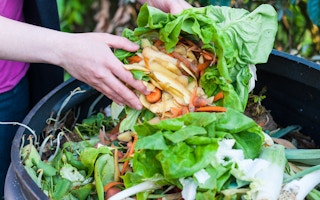To address the growing problem of food waste, Singapore’s National Environment Agency (NEA) will be starting food waste recycling pilot programmes at two hawker centres and a municipal in the city.
To continue reading, subscribe to Eco‑Business.
There's something for everyone. We offer a range of subscription plans.
- Access our stories and receive our Insights Weekly newsletter with the free EB Member plan.
- Unlock unlimited access to our content and archive with EB Circle.
- Publish your content with EB Premium.
“Only 13 per cent of all food waste is recycled today,” noted Grace Fu, the country’s Second Minister for the Environment and Water Resources, at a parliamentary discussion on her ministry’s budget on Wednesday.
Over the past ten years, food waste has increased by almost 50 per cent in Singapore, and currently makes up about 10 per cent of the waste the city generates, Fu said.
“Reducing food content in our general waste stream will help reduce smell and pest concerns. Upstream food waste segregation will also reduce contamination and enable greater recovery of other recyclable materials like plastic containers and cardboard cartons,” she added.
Under the NEA’s new initiative, the two hawker centres will have an on-site recycling machine to convert segregated food waste and leftover food to water or compost. Hawkers and cleaners will be taught to segregate the waste properly, NEA said.
A municipal-level pilot will also be conducted at Clementi, where food waste collected from multiple premises such as shopping malls, schools, hospitals and office buildings will be sent to a centralised recycling facility.
The NEA said this pilot will examine the economic viability of municipal-level food waste collection services and off-site treatment at a centralised recycling facility, as well as assess the feasibility of recovering energy from food waste and used-water sludge, the semi-solid by-product of treated wastewater.
Food waste is an increasingly important issue in affluent Singapore, where about 796,000 tonnes of food was wasted in 2013. That’s one person throwing away 730 bowls of rice in one year - and half of that is generated by households, according to the NEA.
In September last year, the NEA and the Agri-food and Veterinary Authority commissioned a survey on consumer attitudes and behaviour regarding food waste. The results, when ready, will be used to formulate strategies to cut food waste, Fu said.
Besides the food waste programmes, the NEA will also expand its Singapore Packaging Agreement (SPA), a voluntary scheme started in 2007 to reduce packaging waste.
The scheme will now be extended to 2020. It has more than 160 signatories – including companies such as Carlsberg Singapore, Asia Pacific Breweries, Coca-Cola, and Hewlett-Packard – which have collectively reduced about 20,000 tonnes of packaging waste and saved more than S$44 million in material costs in the city.
“The extended SPA will contain new initiatives, such as a database to allow producers to benchmark and realise the potential of reducing their packaging,” Fu said. “We will also be introducing a logo to identify products with reduced packaging so that consumers can make informed choices.”










